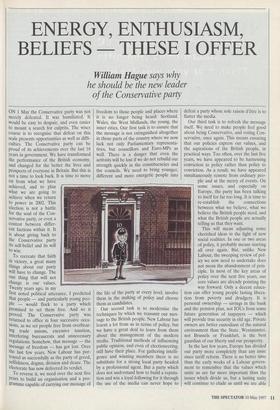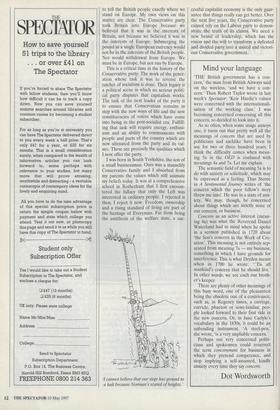ENERGY, ENTHUSIASM, BELIEFS THESE I OFFER
William Hague says why
he should be the new leader of the Conservative party
To recreate that faith in victory, a great many things about our party Will have to change. The one thing that will not change is our values. Twenty years ago, in my first noted political utterance, I predicted that people — and particularly young peo- ple — would flock to a party which promised to set them free. And so it Proved. The Conservative party was returned to office in four successive occa- sion, as we set people free from overbear- !rig trade unions, excessive taxation, Interfering bureaucrats and unnecessary regulations. Somehow, that message — the message of freedom — has got lost. Over the last few years, New Labour has por- trayed us successfully as the party of greed, selfishness, dogma, division and sleaze. The electorate has now delivered its verdict.
To reverse it, we need over the next five Years to build an organisation and a pro- gramme capable of carrying our message of freedom to those people and places where it is no longer being heard: Scotland, Wales, the West Midlands, the young, the inner cities. Our first task is to ensure that the message is not extinguished altogether in those parts of the country where we now lack not only Parliamentary representa- tives, but councillors and Euro-MPs as well. There is a danger that even the activists will be lost if we do not rebuild our strength quickly in the constituencies and the councils. We need to bring younger, different and more energetic people into the life of the party at every level, involve them in the making of policy and choose them as candidates.
Our second task is to modernise the techniques by which we transmit our mes- sage to the British people. New Labour has learnt a lot from us in terms of policy, but we have a great deal to learn from them about the management of the modern media. Traditional methods of influencing public opinion, and even of electioneering, still have their place. For gathering intelli- gence and winning members there is no substitute for a strong local party headed by a professional agent. But a party which does not understand how to build a reputa- tion and win a loyal following for it through the use of the media can never hope to defeat a party whose sole raison d'être is to flatter the media.
Our third task is to refresh the message itself. We need to make people feel good about being Conservative, and voting Con- servative, once again. This means ensuring that our policies express our values, and the aspirations of the British people, in practical ways. Too often, over the last five years, we have appeared to be harnessing conviction to policy rather than policy to conviction. As a result, we have appeared simultaneously remote from ordinary peo- ple and at the mercy of events. On some issues, and especially on Europe, the party has been talking to itself for far too long. It is time to re-establish the connections between what we believe, what we believe the British people need, and what the British people are actually telling us that they want.
In the last few years, Europe has divided our party more completely than any issue since tariff reform. There is no better time than the early weeks of a Labour govern- ment to remember that the values which unite us are far more important than the issues which divide us, but a lasting unity will continue to elude us until we are able to tell the British people exactly where we stand on Europe. My own views on this matter are clear. The Conservative party took Britain into Europe because we believed that it was in the interests of Britain, not because we believed it was in the interests of Europe. Submerging the pound in a single European currency would not be in the interests of the British people. Nor would withdrawal from Europe. We must be in Europe, but not run by Europe.
This is a critical time in the history of the Conservative party. The work of the gener- ation whose task it was to reverse the ratchet of socialism is done. Their legacy is a political scene in which no serious politi- cal party disputes that capitalism works. The task of the next leader of the party is to ensure that Conservatism remains in step with the new ways of life and the new constituencies of voters which have come into being in the post-socialist era. Fulfill- ing that task will require energy, enthusi- asm and an ability to communicate with people and parts of the country which are now alienated from the party and its val- ues. These are precisely the qualities which I now offer the party.
I was born in South Yorkshire, the son of a small businessman. Ours was a staunchly Conservative family and I absorbed from my parents the values which still animate my beliefs today. It was at a comprehensive school in Rotherham that I first encoun- tered the fallacy that only the Left was interested in ordinary people. I rejected it then, I reject it now. Freedom, ownership and a rising standard of living are part of the heritage of Everyman. Far from being the antithesis of the welfare state, a suc- 'I cannot believe that our siege has ground to a halt because Norman's scared of heights.' cessful capitalist economy is the only guar- antee that things really can get better. Over the next five years, the Conservative party cannot rely on the Labour party to demon- strate the truth of its claims. We need a new brand of leadership, which has the vision and the will to transform a defeated and divided party into a united and victori- ous Conservative government.



































































 Previous page
Previous page